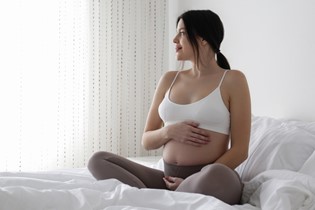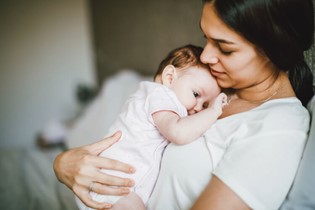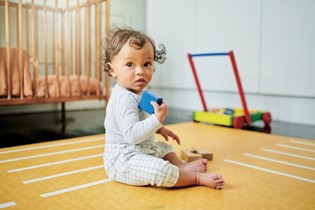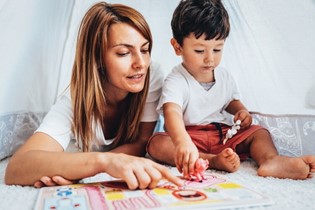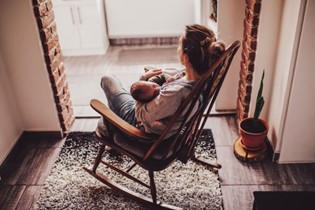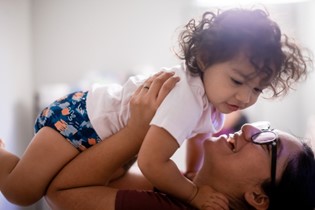Doctor sheds some light on childhood fevers

It can feel scary when your baby has a temperature. General practitioner and urgent care doctor, Dr Isabelle Duck sheds some light on childhood fevers.
Looking after a sick baby can be one of the most challenging moments for new parents. Sick babies are often unsettled, and they often have a fever. They sleep poorly and may be fussy with feeds. Sick babies (particularly those under 12 months) need to be closely monitored. Babies cannot tell you what's wrong, and watching your baby struggle when they are unwell can be really hard on both new and seasoned parents. In my experience, fevers especially provoke much anxiety, so in this article I aim to dispel some of these anxieties and provide some information on how to look after your baby when they're experiencing one. I'll also outline some of the situations when you should seek urgent medical advice.
So, what is a fever?
A fever is a mechanism that the body uses to fight an infection. In most instances, these infections are caused by viruses. A mild fever is defined as 38 to 38.9 degrees Celsius, and a high fever is defined as 39 degrees Celsius or more. Although babies develop a fever to fight an infection, fevers can often make your baby feel quite unwell. It’s important to remember, however, that a fever alone is unlikely to harm your baby. Babies over the age of three months who have a mild fever can often be cared for at home, but need to be taken to the doctor if they have any of the symptoms outlined below, or, if they have had a fever for more than five days.

How can you measure a baby’s temperature at home? I would recommend using a thermometer. Some thermometers are easier to use but may not be quite as accurate as others. Talk to your pharmacist about which is the most suitable for your baby. The pharmacist can also give advice on how to use it. How often you check your baby’s temperature depends on many things, such as how unwell your baby is and whether they have a mild or a high fever. Your doctor can give you more advice on the frequency of checking.
I often explain to parents that a baby with a fever is only part of the story, you really need to take a look at the bigger picture. Specifically, has the baby’s feeding reduced by over a half? Has the number of wet nappies reduced significantly? Is the baby struggling to breathe? Are there any concerning rashes? Is the baby more sleepy than usual? Is there any vomiting? If a baby has any of these symptoms (even if there is no fever) they need to be seen by a doctor as soon as possible. If it is out of hours, they must be taken to the emergency department. Even if they appear well, very young babies with a fever (those under the age of three months) will need urgent assessment by a doctor. At this age, a baby’s immune system is still within the early stages of development which makes them more prone to infections. Another factor to consider, is whether your baby has any other medical conditions. For example, all babies that were born premature, or those with other chronic illnesses (such as congenital heart conditions) need prompt medical assessment if they develop a fever.

The most common cause of a fever in a baby is an upper respiratory tract infection. These types of infections cause symptoms such as a blocked nose and a cough. If your doctor has diagnosed your baby with an upper respiratory tract infection, the management depends on which symptoms your baby has, as well as the severity of these symptoms. A blocked nose can be distressing for babies and can often affect a baby’s ability to take feeds by the bottle or breast. If this is the case, saline nasal drops can be helpful and these can be purchased from a pharmacy or prescribed by a doctor. If you’re concerned about your baby’s feeding, you need to take them to see the doctor. Due to their small size, a baby can become dehydrated very quickly.
A cough is also a common symptom of an upper respiratory tract infection. If you are concerned about the nature of your baby’s cough – the frequency, the sound, or any associated symptoms such as fast breathing, grunting or laboured breathing – you should urgently seek medical advice. Some of these symptoms could indicate that your baby is struggling to get enough oxygen to their lungs.
Other types of infection that can cause fevers in a baby include ear infections, urinary tract infections and gastroenteritis (an infection of the stomach and bowel). Sometimes a baby has a fever and the source of infection is unclear. In this instance, you may be referred to the hospital so a paediatrician can complete further tests. Even if your baby has been examined by a doctor, if you’re still concerned, even if nothing has changed, keep going back.
It should also be noted that some babies develop a fever after their immunisations. Your practice nurse can give you more information about fevers after an immunisation, and when a baby needs to be taken to the doctor. In most cases, fevers usually settle within 48 hours.
If your baby has a fever and is distressed, there are lots of things you can do at home to keep them comfortable. Removing a layer of clothing and making sure their room is not too hot can help, and try to give your baby plenty of oral fluids. It’s not recommended that you put your baby in a cold bath or shower.

I’m often asked about whether a baby with a fever should be given paracetamol. Paracetamol should be used primarily to improve a baby’s comfort, not to reduce a fever. I wouldn't recommend giving paracetamol to a baby with a mild fever who seems otherwise well. Although paracetamol has been widely used for many years, it is a drug. When using paracetamol, make sure you are using the correct dose as advised by the doctor or pharmacist, and make sure to never use it more than four times within a 24 hour period. It must never be given more frequently than every four hours. The best way to ensure the correct dosage of paracetamol is to use a syringe, and do remember that there are different strengths of oral paracetamol liquid. Alternatively, paracetamol is also available in suppository form (a specialised formulation given rectally). Discuss whether this formulation is suitable for your baby with your pharmacist or doctor. As with all medicines, do not forget to ensure that paracetamol is kept away from children in a locked cupboard. If you have accidentally given your baby too much paracetamol, they must be reviewed by a doctor straight away. Do not give paracetamol if your baby is known to have an allergy or has previously had an adverse reaction, and if your baby has any other medical conditions, ask your pharmacist or doctor to check whether it is safe to give.
A note about febrile seizures
These are a type of seizure that a child can have between the ages of six months and five years and are provoked by a fever. They are quite common and can occur in around five percent of children. Although it can be quite distressing for a parent to witness a baby with a febrile seizure, they are rarely harmful. If your baby or child is experiencing a febrile seizure, it is very important that you keep them safe. Lay them in a safe space on their side, don’t put anything inside their mouth, and call an ambulance if your child does not stop seizing within five minutes or if you notice any breathing difficulties or have any other concerns. It’s a good idea to take your child to the doctor once the seizure is over – mainly to check why they have had a fever. Please note that the use of paracetamol does not reduce the risk of febrile seizures.
Fighting infections is a part of a baby’s normal development. Whilst it is important to closely monitor a baby with a fever, and to get them checked by a doctor, remember that in most cases, a fever is a normal mechanism for fighting a mild infection.
Parenting can be challenging at the best of times, but looking after a sick baby can be particularly difficult. My general advice is more cuddles, frequent monitoring and trust your gut. If you feel your baby needs an examination, don’t hesitate to get them checked out by a doctor. And during the long, dark, sleepless nights that you spend with your sick baby, sometimes it is good to remember the wise words of the beloved cartoon dog Bluey: “Being sick is just part of life”.
Dr Isabelle Duck is a general practitioner and the clinical director of Silverdale Medical Urgent Care in Auckland. She lives in Hobsonville with her husband – a lecturer, and their 5-year-old daughter, Lauren.

AS FEATURED IN ISSUE 62 OF OHbaby! MAGAZINE. CHECK OUT OTHER ARTICLES IN THIS ISSUE BELOW


